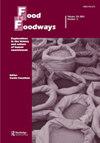Abolitionist food justice: Theories of change rooted in place- and life-making
IF 1.1
Q2 ANTHROPOLOGY
引用次数: 3
Abstract
ABSTRACT In recent years, communities invested in transformative food politics in the United States have seen the framework food justice become widely accepted as a core framework for anti-racist practice. Critical food scholars often recognize food justice in practices that: underwrite coalitions and solidarities across difference, tend to collective and historical trauma, and expand land-based political imaginations. This paper argues that abolitionist thought can position these elements within in a relational, historical framework that enables organizers to name the underlying racial capitalist logics of food apartheid—including the destruction of Black, Indigenous, and poor peoples’ senses of place, and white supremacy culture’s dehumanization of people who fall outside the norms of liberal individualism—in order build strategic alliances with those who struggle against other manifestations of the same logics, including mass incarceration. Citing work at the intersection of food and carceral justice in New York’s Hudson Valley, this paper humbly affirms what abolitionist organizers already know: that life is possible and is already flourishing well outside of racial capitalism and settler colonialism’s death dealing logics. Abolitionist thought may be an essential tool for strengthening our relationships to and analyses of food and food justice, such that we may organize more effectively to end food apartheid.废除主义食物正义:植根于地方和生活创造的变革理论
近年来,在美国投入变革食品政治的社区已经看到食品正义框架被广泛接受为反种族主义实践的核心框架。批判性的粮食学者经常在实践中认识到粮食正义:支持跨越差异的联盟和团结,倾向于集体和历史创伤,并扩大基于土地的政治想象力。本文认为,废奴主义思想可以将这些因素置于一个相关的历史框架中,使组织者能够命名食物种族隔离的潜在种族资本主义逻辑——包括破坏黑人、土著和穷人的地方感,以及白人至上文化对那些不符合自由个人主义规范的人的非人化——为了与那些反对同样逻辑的其他表现形式(包括大规模监禁)的人建立战略联盟。这篇论文引用了纽约哈德逊河谷食物和司法交叉领域的研究成果,谦虚地肯定了废奴主义者组织者已经知道的事情:在种族资本主义和移民殖民主义的死亡处理逻辑之外,生命是可能的,并且已经蓬勃发展。废奴主义思想可能是加强我们与食物和食物正义的关系和分析的重要工具,这样我们就可以更有效地组织起来,结束食物种族隔离。
本文章由计算机程序翻译,如有差异,请以英文原文为准。
求助全文
约1分钟内获得全文
求助全文
来源期刊

Food and Foodways
ANTHROPOLOGY-
CiteScore
2.20
自引率
0.00%
发文量
16
期刊介绍:
Food and Foodways is a refereed, interdisciplinary, and international journal devoted to publishing original scholarly articles on the history and culture of human nourishment. By reflecting on the role food plays in human relations, this unique journal explores the powerful but often subtle ways in which food has shaped, and shapes, our lives socially, economically, politically, mentally, nutritionally, and morally. Because food is a pervasive social phenomenon, it cannot be approached by any one discipline. We encourage articles that engage dialogue, debate, and exchange across disciplines.
 求助内容:
求助内容: 应助结果提醒方式:
应助结果提醒方式:


